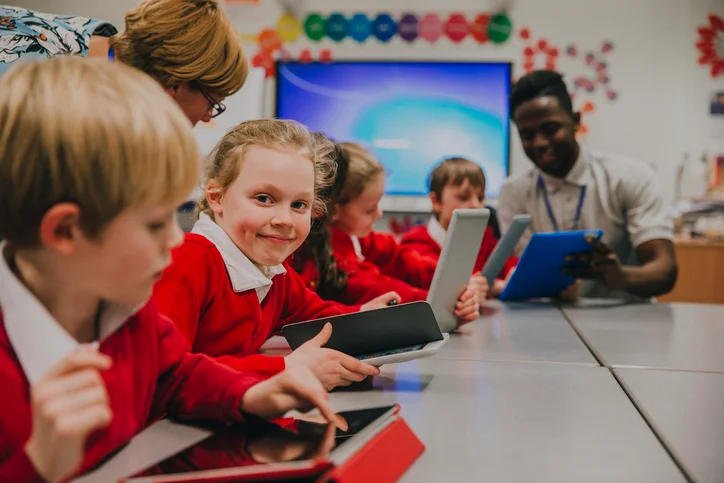Table of Contents
Special Education Resources In the realm of Special Education Resources, educators are continually seeking innovative tools and methods to enrich the learning experience for students with diverse needs. Whether in inclusive classrooms or specialized settings, the landscape of educational resources has expanded significantly, offering a plethora of options to cater to various learning styles and abilities.

Assistive Technology
Assistive technology stands at the forefront of modern Special Education Resources tools, revolutionizing how students with disabilities engage with learning materials. Devices such as text-to-speech software and graphic organizers empower students by providing alternative means of accessing and comprehending information. These tools not only enhance independence but also promote inclusion by bridging the gap between students with disabilities and their peers.
Universal Design for Learning (UDL)
Universal Design for Learning (UDL) principles underscore the importance of designing curriculum materials and activities that accommodate diverse learning needs from the outset. By incorporating multiple means of representation, action, and expression, educators can create a more inclusive and supportive learning environment. UDL resources such as flexible instructional materials and accessible digital content foster engagement and participation among all students, regardless of their abilities.
Behavior Management Strategies
Effective behavior management is integral to creating a conducive learning environment for students with special needs. Resources that focus on positive behavior intervention and support (PBIS) provide educators with frameworks and strategies to promote positive behaviors and address challenging situations constructively. Techniques like visual schedules and self-regulation tools empower students to manage their behavior independently, contributing to a more harmonious classroom atmosphere.
Professional Development Programs
Continuous professional development is essential for educators striving to meet the diverse needs of their students effectively. Specialized programs and workshops offer valuable insights into adaptive teaching strategies and differentiated instruction techniques. These resources not only enhance educators’ skills but also equip them with the knowledge needed to implement evidence-based practices that support the academic and social-emotional growth of students with disabilities.
Collaborative Learning Communities
Collaborative learning communities provide opportunities for educators, parents, and specialists to collaborate and share insights on best practices in Special Education Resources. Platforms such as online forums, professional networks, and community-based organizations facilitate ongoing discussions and resource sharing. By fostering a collaborative approach, these communities empower stakeholders to collectively address challenges and explore innovative solutions in the field of Special Education Resources.
Individualized Education Plans (IEPs)
Individualized Education Plans (IEPs) serve as personalized roadmaps for students with disabilities, outlining their unique learning goals, accommodations, and support services. Resources that assist in IEP development and implementation ensure that educational interventions are tailored to meet each student’s specific needs. Tools such as IEP meeting facilitation guides and data tracking templates enable educators and parents to monitor progress and make informed decisions to support student success.
Transition Services
Preparing students with disabilities for transition from school to post-school life is a critical aspect of Special Education Resources. Transition services encompass resources that focus on career exploration, vocational training, and independent living skills. These resources aim to empower students with the knowledge and skills needed to achieve personal and professional milestones beyond the classroom.
Adaptive Physical Education
Adaptive physical education programs cater to the unique physical and motor development needs of students with disabilities. Resources in this domain include modified sports equipment, inclusive fitness programs, and physical therapy tools. By promoting physical activity and motor skills development, these resources contribute to the overall well-being and holistic development of students with special needs.
Family Engagement Resources
Involving families in the educational journey of students with disabilities is essential for fostering a supportive and collaborative learning environment. Family engagement resources provide parents and caregivers with information on advocacy, support services, and home-based learning activities. Platforms such as parent support groups and workshops empower families to play an active role in their child’s Special Education Resources and overall development.
Assistive Learning Materials
Assistive learning materials encompass a wide range of resources designed to accommodate diverse learning needs and preferences. These may include braille books, tactile learning tools, and augmented reality apps tailored to support students with visual impairments, learning disabilities, or sensory processing disorders. These innovative tools aim to enhance accessibility and engagement in both classroom and remote learning environments.
Cultural Competence in Special Education
Promoting cultural competence within the realm of Special Education Resources ensures that educators recognize and respect the cultural backgrounds and identities of their students. Resources that focus on culturally responsive teaching and inclusive practices empower educators to create learning environments that celebrate diversity and promote equity. By integrating culturally relevant content and perspectives, these resources foster a sense of belonging and enhance educational outcomes for all students.
Funding and Grants for Special Education Programs
Accessing adequate funding is crucial for implementing effective Special Education Resources programs and initiatives. Resources that provide information on grant opportunities, funding sources, and financial planning enable educators and administrators to secure the resources needed to support students with disabilities. By leveraging funding opportunities, schools can enhance their capacity to provide inclusive education and meet the diverse needs of all learners.
Special Education Resources
In conclusion, the field of Special Education Resources is rich with innovative tools, strategies, and collaborative opportunities aimed at enhancing instructional practices and supporting the diverse needs of students with disabilities. By leveraging these resources—from assistive technology and UDL principles to behavior management strategies and family engagement initiatives—educators can create inclusive learning environments where every student has the opportunity to thrive academically, socially, and emotionally. Embracing a holistic approach that values diversity and promotes equity ensures that all students receive the support and resources they need to achieve their full potential.





More Stories
How Busy Parents Can Unlock Extraordinary Growth in Their Child’s Education
How Special Needs Advocates Empower Families
Why Special Needs Preschools Are Essential for Growth